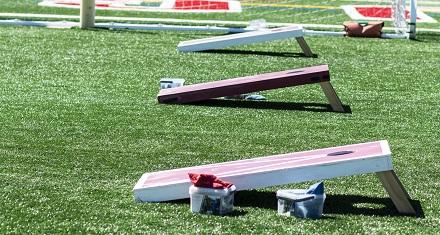

The ACO 2020 Worlds took place in late July over multiple days at the Columbia Metropolitan Convention Center. According to the Columbia Star, the five-day event attracted more than 300 professional players from 24 states, plus more than 350 competitors in the “tailgater” divisions.
“We have male, female, doubles, seniors, juniors, and mixed doubles categories, to name just a few,” ACO founder and president Frank Geers told the paper. “The tailgater divisions play for prizes provided by our sponsors. The professionals play for prizes and money, but more importantly, the professional singles division plays for the honor of being crowned ACO World Singles Champion. Men and women can compete against each other for the crown, and it doesn’t matter if you’re eight years old or 80. You could be crowned ACO World Champion.”
Literally. The ACO 2020 World Cornhole Champion received a crown and cape.
Not to be outdone, the ACL hosted its 2020 World Championships at the Rock Hill (S.C.) Sports and Events Center a few weeks later, from Aug. 4-9 — with a guaranteed minimum payout of $150,000. ESPN was planning coverage.
Cities around the United States (not just in South Carolina) appear to have embraced cornhole as a safe and welcome form of sports competition in the midst of the pandemic. Social distancing is built into the rules, and there’s no close contact or sharing of balls. Players toss for money, prestige and charity.
While the ACO Worlds were taking place in South Carolina, cornhole rounds were happening in Lincoln, Neb., as part of the Cornhusker State Games. This was the second year in which cornhole was part of the 16-day event.
“Everybody wants to high five or shake after a good game, but we discourage that; [if] you want the elbow bump or just the remote handshake, … we encourage that,” Brad Sebby, a volunteer for the Cornhusker State Games at the cornhole event told Lincoln’s ABC-TV affiliate, KLKN. “We’re definitely happy to play. I mean, we all want sports of some kind during the pandemic, and this is a little trace of that.”
Also in late July, 64 cornhole teams brought their own bags to the Badger State Games tournament in La Crosse, Wis. While many other events in the statewide Olympic-style competition were canceled because of the coronavirus, cornhole was among the activities that took place as scheduled.
“It’s kind of one of those things where we get to forget about what’s going on out in the real world and just come and have a good time,” Michael Taggart, commissioner of Coulee Region Cornhole, told News8000.com. “This started as backyard game but now … is something that people are playing all around the United States at a competitive level.”
On the first Friday in August, the Tom & Soni Sheehan Boys & Girls Club of Noblesville (Ind.) hosted its fifth annual Cornhole Tournament at a local park; all proceeds benefited the club. Attendees were asked to bring their own chairs and practice social distancing, and competitors were required to use hand sanitizer before and after every game, according to The Times of Hamilton County, Ind. They also were offered the option to bring their own bags, and face masks were encouraged but not required. Prior to this year’s competition, the event raised approximately $30,000 in four years.
The American Cornhole Association offers a listing of upcoming cornhole tournaments, as well as a tournament guide to help organizers put on successful cornhole events.

